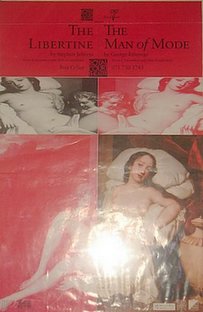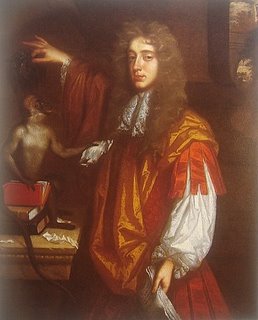
The poster of a double-bill evening at the Royal Court Theatre, circa 1995
As promised, I will try to share with the Right Honourable Reader the logbook of my recent trip into the universe of "The Libertine". What immediately came to my attention when I first got acquainted with my Lord Rochester was the fortunate conjunction of so many kudos or brownies points in my personal table board. Let's check. Relevant historical period (Restoration), importance of Theatre as the art-form of his Times and a rather first class personification of the myth of Don Juan. Bingo!
Let's take on History first. I hope I've made clear for some time now that I believe in a kind of 'quantic' or darwinian evolutionary History whereby more important than a slow chronological flux are some crucial "nodules", historical short periods who have critical mass of data, revolutionary energy and political "pathos" (either drama or tragic-comedy) enough to carry us, - in a quantum-like leap - into new times. The "nodule" Restoration is a very interesting one indeed. When the exiled son of the decapitated king returns to Britain in 1660, as Charles II, an intense and exhilarating unstable chunk of history ensues. For a brief period, not one single ideology, or political movement, or institution of statecraft, or religion apparatus was strong enough in itself to impose its viewpoint or its solutions. People were fed up with the Puritanical party-pooper's zeal of Cromwellian times and welcomed, at least in London, the soft debauche of the restaured monarchy. And the art form which provided the aptest expression of that age was Restoration drama. Theatre as the key to revisit the inner loins of that period ! (as Cinema is doing for these days and ages) To make it a little more appealing to our patriotic eyes we even have a certain Catherine, a Portuguese Queen, kind but moustachoed, sweet and accommodating but ugly as the Sin. Too crude? My apologies. Allow me to proceed.
In each "nodule" there are illuminating biographical case-studies. Among these particular revealing biographies, as code-breakers to certain periods of history, I've always had a fascination for rebellious gentlemen who incurred many risks in order to protect their individual freedoms and beliefs, and who, to top it all, have left beautifully written accounts of their individual struggle. ( Casanova name immediately comes to one's mind whereas the most evident cases in the A-league of English Literature, the only writers that had lived their art to the same degree as Rochester, are Lord Byron and Oscar Wilde)
As for libertine mores, it will not come as a surprise to the Right Honourable Reader if this blogger of yours confesses a certain obsession with the Don Juan myth. Allow me to quote here Prof John Barnard, who edited the play (Etherege's "The Man of Mode") where the main character (Dorimant) is none other but a thinly disguised Lord Rochester :
"Don Juan, the seventeenth-century creation who stands as a naturalist and rationalist antagonist to précieux idealizing of Courtley Love. (Just as Machiavelli's semi-mythic status reflects the emotional and intellectual crisis consequent upon the discovery of Realpolitik in the late sixteenth and seventeenth centuries, and Faustus testifies to the scientific assault on the boundaries of God-given knowledge, Don Juan is a response to related crisis in sexual attitudes). (...) Dorimant is allied to Don Juan and hence to the libertine and skeptical strain in seventeen-century culture, whose most obvious contemporary exemplar was Lord Rochester".
Not everybody's cup of tea? Open to easy attempts at character assassination like this one from Samuel Johnson:
"in a course of drunken gaiety and gross sensuality, with intervals of study perhaps yet more criminal, with an avowed contempt of decency and order, a total disregard to every moral, and a resolute denial of every religious observation, Lord Rochester lived worthless and useless, and blazed out his youth and health in lavish voluptuousness".

Jacob Huysmans's famous painting at National Portrait Gallery, London
depicting Rochester with a monkey
Is this then what made the figure of John Wilmot so appealing to generate one contemporary play (the already mentioned "The Man of Mode" from his good friend George Etherege, later knighted); inumerous entries in contemporary memorial efforts, including in Pepys' diaries; an extensive list of biographers (from the seventeen-century onwards with metronomical regularity, including, in 1974, from Graham Greene himself - "Lord Rochester's Monkey"; and, as the more recent pinnacle, a modern play, by Stephen Jeffreys ("The Libertine" )http://www.dramaticpublishing.com/jeffreys.html. It was that play which turned into a movie script gave us Johny Depp excelling in the powerful lines of the Prologue:
"Allow me to be frank at the commencement. You will not like me. No, I say you will not. (...) But later when you shag - and you will shag, I shall expect it of you and I will know if you have let me down . I wish you to shag with my homuncular image rattling in your gonads. Feel how it was for me, how it is for me and ponder: Was that shudder the same shudder he sensed? Did he knew something more profound? Or is there some wall of wretchedness that we alll batter with our heads at that shining livelong moment! That is it. That is my prologue, nothing in rhyme, certainly no protestations of modesty, you were not expecting that I trust. I reiterate only for those who have arrived late or were buying oranges or were simply not listening: I am John Wilmot, Second Earl of Rochester and I do not want you to like me."
But we do, my Lord, we do..
(to be continued)
No comments:
Post a Comment